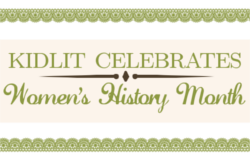March 24 - Today's post provided by Tonya Bolden
“There is poetry and fiction. There is art and essay. . . . There is grace, courage, pain, outrage, drama (literally): not a little heat and so much light.”
This is from my introduction to 33 Things Every Girl Should Know About Women’s History, an anthology I assembled many years ago and one that contains Abigail Adams’s famous letter to her husband, John, “Remember the Ladies.”
I fondly remembered the contemporary ladies who contributed to the anthology in my introduction. “Vital voices” I called them. I noted, for example, that readers would hear from “a Coline and a Joline . . . a Judy . . . two Anns . . . an Anastasia and a Shana . . . a Betsy and an Elisabeth and Elizabeth.”
I wanted to salute the contributors up front because along with my soulful, editor, Nancy Hinkel, these women were such gems, from journalist Magee Hickey and co-founders of the Elizabeth Cady Stanton Trust, Coline Jenkins and Marsha Weinstein, to authors Kathleen Krull, Betsy Kuhn, and Pat McKissack.
Putting an anthology together can quite nerve-wracking. Between the paperwork, the brainstorming on ideas and approaches, the setting of deadlines, and the scheduling of time for editing sessions, things can pretty get hectic and intense. Too, with so many moving parts, there’s the anxiety that something will go wrong - terribly wrong. Will someone back out? Will a contributor go off script?
I’m not going to say that the making of 33 Things Every Girl Should Know About Women’s History didn’t have its glitches, but when I reflect on the experience, I feel fortified all over again. Passionate about women’s history, passionate about educating, enlightening and inspiring the next generation, and ever grateful for the trails their collective foremothers blazed, the contributors brought to the project such enthusiasm, such generosity of spirit. They inspired me.
We never got together as a group. Many of us did not personally know one another prior to the project. We were of different ages, came from different places, and were of different racial/ethnic backgrounds. Yet, I felt a sisterhood was going on.
And I learned so much, whether it was “Don’t Agonize, Organize!” (about reformers) by visual artist, Ann Decker, or “The Facets of Feminism” by history professor Paula A. Treckel. Until I read Suheir Hammad’s poem “U.S. Women Are Diverse” I wasn't familiar with the Egyptian singer Um Kalthoum. Similarly, I had never heard of the first female astronaut candidate, Jerrie Cobb, until I received Sue Macy’s piece “Who Was First and Why It Matters.”
Piece after piece made me all the more hungry for women’s history. Piece after piece made me so grateful to the contributors. The women my editor and I reached out to had more than enough in their lives to keep them busy. On top of that, some were in pain. A sister’s child came down with a strange ailment. A husband was seriously ill. A mother died. Yet, like others in the book, these women were troopers. They gave their utmost. In the case of Safiya Henderson-Holmes, it was permission to reprint her poem, "rituals of spring," about the tragic fire on March 25, 1911, at New York City's Triangle Shirtwaist Company. And for the book, Safiya penned a brief note setting up her haunting poem, a note when she herself was, unbeknownst to me, in crisis. Safiya died before the book came out.
And one contributor did indeed go off script. She was editor, broadcast and print journalist, and perpetual poet Judy Dothard Simmons (d. 2007). As I recall, Judy was to write an essay on language vis-a-vis women and women’s history. One day she called me up to say, she had been moved to take a different route. She would send the piece and if I didn’t like it, she’d go back to the drawing board, she said.
Judy was one of the contributors I had known for many years. I had long held her intellect in high regard and had a holy envy of her way with words, so I didn’t panic (too much) as I waited to receive her piece.
When I did, I was overjoyed. While Judy had not followed the “letter of the law” she had most definitely followed the spirit. Her piece was organic. It was natural. It was a poem, titled “A Herstory of Language.”
One of its lines I carry with me still is the quiet, but profound: “Language is no simple thing.”
And the last line of Judy's poem makes a good tag line, I think, for Women’s History Month.
Learn herstory. Balance the world!
Editor's Note:
Tonya Bolden is the author/editor of more than twenty books. You can learn more about her work at tonyaboldenbooks.com














Tonya: I am proud to have been a part of 33 Things and I'm thrilled to see it's still in print. You did a masterful job. I'm up for "33 More Things." How about it?
ReplyDeleteAs I mentioned to you in my email, Tonya, in a small way, I feel that our experience this month in bringing together such wonderful contributors for this blog must be similar to the way you felt in creating 33 Things... ... an exhausting, exhilarating, and truly inspiring experience. Hopefully, together, we may inspire a new generation of writers and the women about whom they write. Thanks so much to all of you.
ReplyDelete